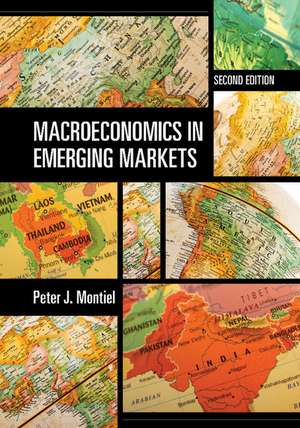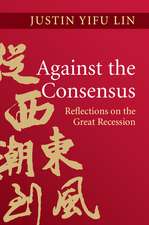Macroeconomics in Emerging Markets
Autor Peter J. Montielen Limba Engleză Paperback – 28 apr 2011
| Toate formatele și edițiile | Preț | Express |
|---|---|---|
| Paperback (1) | 689.33 lei 6-8 săpt. | |
| Cambridge University Press – 28 apr 2011 | 689.33 lei 6-8 săpt. | |
| Hardback (1) | 1618.81 lei 6-8 săpt. | |
| Cambridge University Press – 28 apr 2011 | 1618.81 lei 6-8 săpt. |
Preț: 689.33 lei
Preț vechi: 774.52 lei
-11% Nou
Puncte Express: 1034
Preț estimativ în valută:
131.91€ • 138.35$ • 109.81£
131.91€ • 138.35$ • 109.81£
Carte tipărită la comandă
Livrare economică 01-15 aprilie
Preluare comenzi: 021 569.72.76
Specificații
ISBN-13: 9780521733045
ISBN-10: 0521733049
Pagini: 778
Ilustrații: 98 b/w illus. 32 tables
Dimensiuni: 178 x 251 x 43 mm
Greutate: 1.28 kg
Ediția:Revizuită
Editura: Cambridge University Press
Colecția Cambridge University Press
Locul publicării:New York, United States
ISBN-10: 0521733049
Pagini: 778
Ilustrații: 98 b/w illus. 32 tables
Dimensiuni: 178 x 251 x 43 mm
Greutate: 1.28 kg
Ediția:Revizuită
Editura: Cambridge University Press
Colecția Cambridge University Press
Locul publicării:New York, United States
Cuprins
Preface; Part I. The Macroeconomic Framework: 1. Introduction and overview; 2. Concepts and definitions: the macroeconomic accounts; 3. Short-run macroeconomics and long-run growth; Part II. A Benchmark Macroeconomic Model: 4. The aggregate production function, the labor market, and aggregate supply; 5. Aggregate demand and goods market equilibrium; 6. Financial markets; 7. Short-run macroeconomic equilibrium; 8. Medium-run macroeconomic equilibrium; Part III. Public Finance and Macroeconomic Performance: 9. The intertemporal budget constraint of the public sector; 10. Sovereign risk premia; 11. Fiscal institutions; 12. Privatization; 13. High inflation and inflation stabilization; Part IV. Monetary Institutions and Monetary Policy: 14. Monetary institutions; 15. Inflation targeting; Part V. Exchange Rate Management: 16. Equilibrium real exchange rates; 17. The benchmark model with floating exchange rates; 18. Exchange rate regimes; 19. Managing an officially-determined rate; Part VI. The Financial Sector and Macroeconomic Performance: 20. Finance, welfare, and growth; 21. Financial repression; 22. Financial reform; 23. The benchmark model with banks; 24. Coping with capital inflows; Part VII. Varieties of Emerging-Market Crises: 25. Sovereign debt crises; 26. Banking crises; 27. Currency crises and crisis interactions; 28. Lessons from the emerging market crises of the nineties; 29. Lessons from the great recession.
Recenzii
'This much enriched edition of Peter Montiel's book provides a clear and thorough introduction to the macroeconomic issues that developing countries and emerging markets in general face in a globalized world. Students and economists in policy circles will find the core short-run macroeconomic model that it uses with so much versatility to be of invaluable help in understanding the fundamental nature of these issues and in thinking about how to respond to them.' Pierre-Richard Agénor, University of Manchester
'A book that should remain on the desk of any economist working on emerging markets. A rigorous journey from first principles all the way to current issues, be it the effects of the crisis on emerging-market countries or the potential role of capital controls in responding to capital inflows. If you are new to the topic, read the book from beginning to end. If you think you know it all, still look and read the relevant chapters: you will learn.' Olivier J. Blanchard, Massachusetts Institute of Technology and the International Monetary Fund
'Remarkably, the second edition is even better than the first. It finds just the right balance between theory, policy analysis, and empirical applications. The exposition remains crisp and lucid, while the addition of new material on fiscal institutions, the role of banks in the monetary transmission mechanism, inflation targeting, emerging-market financial crises, and policy responses to the Great Recession makes the text more rigorous and comprehensive.' Edward F. Buffie, Indiana University
'Peter Montiel has long set the highest standard for lucid textbooks on the macroeconomics of developing countries. Now in this new edition of his superb classic Macroeconomics in Emerging Markets, he has surpassed even himself. He uniquely fills the gap between rich-country-obsessed macro- and micro-obsessed developing-country analysis. No student of the macroeconomics of development will henceforward be able to do without this book.' William Easterly, New York University
'This book is a timely and authoritative survey of theory and evidence on macroeconomic policies in emerging-market economies. Peter Montiel knows this material from all angles - as a researcher, master teacher, and practitioner. This is an indispensable resource for development economists working in the field, as well as for graduate students or advanced undergraduates working on open economy macroeconomics in developing countries.' Steven A. O'Connell, Swarthmore College
'Peter Montiel's Macroeconomics in Emerging Markets brings to life with clear analysis and real-life examples many of the macroeconomic policy challenges faced by emerging markets. The topics covered range from the design of monetary policy to curb stubborn inflation to the timeless policy dilemmas that coping with volatile international capital flows and commodity prices pose for these countries. A must-read for those seeking to understand and teach students how most of the world lives.' Carmen M. Reinhart, Peterson Institute for International Economics
'[Recommend] to both students and to lecturers aiming at 'freshing up' their lectures by making them more relevant. For the latter, this is a great place to start.' The Times Higher Education Supplement
'A book that should remain on the desk of any economist working on emerging markets. A rigorous journey from first principles all the way to current issues, be it the effects of the crisis on emerging-market countries or the potential role of capital controls in responding to capital inflows. If you are new to the topic, read the book from beginning to end. If you think you know it all, still look and read the relevant chapters: you will learn.' Olivier J. Blanchard, Massachusetts Institute of Technology and the International Monetary Fund
'Remarkably, the second edition is even better than the first. It finds just the right balance between theory, policy analysis, and empirical applications. The exposition remains crisp and lucid, while the addition of new material on fiscal institutions, the role of banks in the monetary transmission mechanism, inflation targeting, emerging-market financial crises, and policy responses to the Great Recession makes the text more rigorous and comprehensive.' Edward F. Buffie, Indiana University
'Peter Montiel has long set the highest standard for lucid textbooks on the macroeconomics of developing countries. Now in this new edition of his superb classic Macroeconomics in Emerging Markets, he has surpassed even himself. He uniquely fills the gap between rich-country-obsessed macro- and micro-obsessed developing-country analysis. No student of the macroeconomics of development will henceforward be able to do without this book.' William Easterly, New York University
'This book is a timely and authoritative survey of theory and evidence on macroeconomic policies in emerging-market economies. Peter Montiel knows this material from all angles - as a researcher, master teacher, and practitioner. This is an indispensable resource for development economists working in the field, as well as for graduate students or advanced undergraduates working on open economy macroeconomics in developing countries.' Steven A. O'Connell, Swarthmore College
'Peter Montiel's Macroeconomics in Emerging Markets brings to life with clear analysis and real-life examples many of the macroeconomic policy challenges faced by emerging markets. The topics covered range from the design of monetary policy to curb stubborn inflation to the timeless policy dilemmas that coping with volatile international capital flows and commodity prices pose for these countries. A must-read for those seeking to understand and teach students how most of the world lives.' Carmen M. Reinhart, Peterson Institute for International Economics
'[Recommend] to both students and to lecturers aiming at 'freshing up' their lectures by making them more relevant. For the latter, this is a great place to start.' The Times Higher Education Supplement
Notă biografică
Descriere
This second edition textbook shows how macroeconomic models for industrial countries may be applied to emerging and developing economies.















